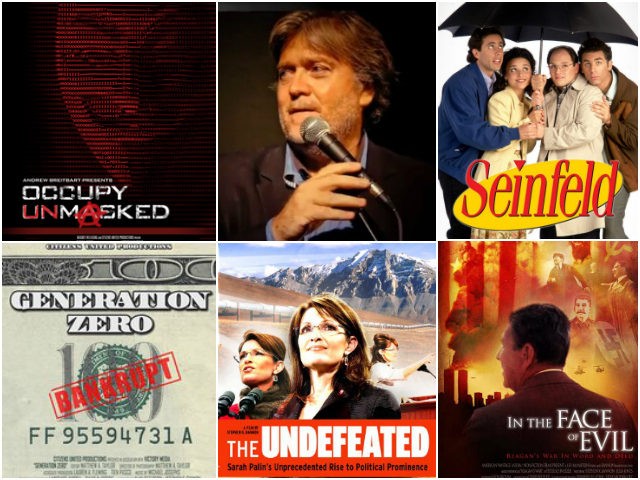Daniel Miller reports in the Los Angeles Times about the Hollywood career of Breitbart Executive Chairman Stephen K. Bannon, who took a leave of absence from Breitbart to serve as CEO of Republican nominee Donald Trump’s campaign.
Bannon mostly worked as a deal maker, handling pacts involving Westinghouse, Metro-Goldwyn-Mayer and Polygram.
Former business associates of Bannon described him as smart and shrewd — but sometimes peripheral to the deals that he has been given credit for orchestrating. Nonetheless, Bannon’s work in Hollywood sparked his media career and helped to pave the way for his eventual move into the political realm.
Lionel Chetwynd, who co-founded Friends of Abe, a group for Hollywood conservatives, said it was inaccurate to dismiss Bannon as a “peripheral” Hollywood figure, adding that “anyone who came here who had the guts to get in the pit … and go try to make something happen” could not fairly be labeled as such.
“I think that Steve Bannon did get a great benefit from Hollywood,” said Chetwynd, a filmmaker whose writing credits include “The Apprenticeship of Duddy Kravitz.” “I’ve felt this guy has a good grasp of what is going on out there.”
[…]
A former naval officer who grew up in Norfolk, Va., Bannon graduated from Harvard Business School in 1983. Soon after, he began working at Goldman Sachs, where, in the late 1980s, he experienced the ups and downs of the financial business.
Bannon left Goldman in 1990 and headed to Los Angeles along with an ex-Goldman colleague, John Talbott. Together they launched investment banking firm Talbott, Bannon & Co. in 1990, opening offices in Beverly Hills, according to state records. They soon lined up $100 million in financing from NHK for a production company headed by Thom Mount, who was developing “The Indian Runner” with Phillips and would go on to executive produce it.
Mount, the former president of Universal Pictures, got to know Bannon well during this period.
“He was constantly telling stories about great warriors of the past, like Attila the Hun, people who had slain empires,” Mount said. “It’s one thing to be interested in the triumphs of military history, it’s another thing to obsess over them. Victory at all costs is a dangerous way to look at the world.”
[…]
Bannon & Co. went on to work on a handful of high-profile Hollywood deals. Among them was the purchase by Turner Broadcasting of Castle Rock, the film and TV production company whose co-founders included Horn and Reiner. In the negotiations, Bannon represented Westinghouse, which owned 15% of Castle Rock. As part of his payment, Bannon’s firm received a stake in rights to five TV shows, including “Seinfeld,” according to a 2015 article in Bloomberg Businessweek.
At the time, the comedy was just getting its sea legs, but it would, of course, go on to become one of the biggest hits of all time.
While it’s not clear how much money Bannon has made from “Seinfeld” royalties, it was unquestionably a profitable bet for him.
“I told him, if you’re in the mood to gamble, that would be the gamble to make,” Mount said.
In 1998, French banking and financial services company Societe Generale acquired Bannon’s firm, paving the way for his eventual reinvention as a conservative filmmaker.
People who knew Bannon during his 1990s Hollywood foray said that while he espoused conservative views, his political leanings did not shape his business pursuits until later.
Spurred on in part by 9/11, Bannon spent part of the 2000s transforming himself into a documentarian. In 2004, Bannon wrote, directed and co-produced “In the Face of Evil: Reagan’s War in Word and Deed.” The limited-release film grossed only $110,577 in the U.S. and Canada, according to research firm the Numbers. But the documentary reportedly drew the attention of Andrew Breitbart, the founder of his eponymous news venture, who would later become Bannon’s friend and business associate.
Read the rest here.

COMMENTS
Please let us know if you're having issues with commenting.